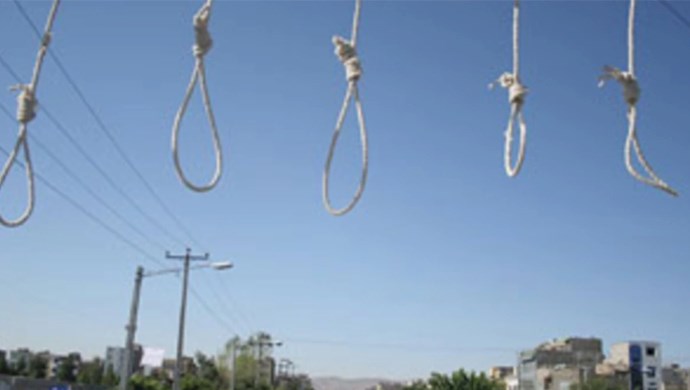Analysis by PMOI/MEK
Iran, October 10, 2021—As people around the globe mark the World Day Against the Death Penalty, Iran is faced with a human rights crisis that needs international attention.
This year, Ebrahim Raisi, a mass executioner, was appointed as the new president of the regime. Raisi has taken office with a long list of human rights violations.
He was a key member of the “death commission,” a group of regime officials who sentenced more than 30,000 political prisoners to death in the summer of 1988. Most of the executed prisoners were members and supporters of the People’s Mojahedin Organization of Iran (PMOI/MEK) and they were executed on the grounds of opposing the regime’s fundamentalist and tyrannical rule. Prisoners who have survived or escaped Iran’s prisons have given harrowing testimonies of Raisi’s role in sending dissidents to the gallows. In his first press conference as the regime’s president, Raisi defended his actions in executing political prisoners and described himself as an advocate of human rights.
Many jurists and legal experts have described the 1988 massacre of Iranian political prisoners as a crime against humanity and a genocide and have called for an international tribunal to investigate and try its perpetrators, including Raisi and regime supreme leader Ali Khamenei.
Before his rise to presidency, Raisi was the chief of the judiciary branch, and under his watch, executions in Iran saw a surge. Following the November 2019 nationwide uprisings, thousands or arrested demonstrators were tortured in Iran’s prisons and many were killed under torture. Under Raisi’s watch as chief of judiciary, the regime executed several dissidents, including Mostafa Salehi and Navid Afkari, who had been arrested for taking part in peaceful protests. Other dissidents continue to linger in prison and have been enduring severe torture and inhumane conditions.
When Raisi was appointed as president of the regime, the Secretary General of Amnesty International said, “Ebrahim Raisi has risen to the presidency instead of being investigated for the crimes against humanity of murder, enforced disappearance, and torture is a grim reminder that impunity reigns supreme in Iran.”
But Raisi is not the only incumbent senior official in Iran whose hands are stained with the blood of innocents. The new judiciary chief, Gholam-Hossein Mohseni Ejei, also has a long history of human rights abuses. One of the key highlights of his career was the arbitrary arrest, torture, and killing of protesters during the 2009 nationwide uprisings. At the time, he was the intelligence minister. In his career, Mohseni Ejei also held several posts in the judiciary, where he has been a key contributor to the regime’s human rights abuses. Today, he oversees torture and executions in Iran’s prisons.
And the new head of the Majlis (parliament), Mohammad Bagher Ghalibaf, is a veteran of the Revolutionary Guards (IRGC) who has been deeply involved in the repression of dissidents and protesters. Ghalibaf has openly boasted of his role in cracking down on protesters and beating and killing them in the streets.
For decades, the regime has enjoyed impunity for mass executions and crimes against humanity. The inaction of the international community has given the regime free pass to continue executions and human rights abuses without fear of global reprisal. Executions are among the key tools of governance and survival in the regime, manifested in the bloody careers of the three heads of the branches of power in Iran.
The regime seeks to keep Iran’s restive population in check through executions and suppression.
As Mrs. Maryam Rajavi, the president-elect of the National Council of Resistance of Iran (NCRI), said in a message on the occasion of the World Day Against the Death Penalty, “Khamenei seeks to intensify suppression, torture and execution of all prisoners in an attempt to save the regime from being overthrown, similar to the 1988 massacre. For this purpose, the regime has imposed inhumane pressures not only on political prisoners but all prisoners. The regime tortures prisoners to the brink of death and effortlessly sends them to the gallows in a bid to intimidate the society and, in its view, to block the path of uprisings.”
Today, it is more important than ever for the world to hold the Iranian regime to account for its human rights abuses.
No to the Regime of Executions & Massacres
The Imperative of International Prosecution of Khamenei & Raisi
Maryam Rajavi’s message on World Day Against the Death Penalty #StopExecutionsinIranhttps://t.co/RKhVzhJner pic.twitter.com/sbxst5zrWG— Maryam Rajavi (@Maryam_Rajavi) October 9, 2021





